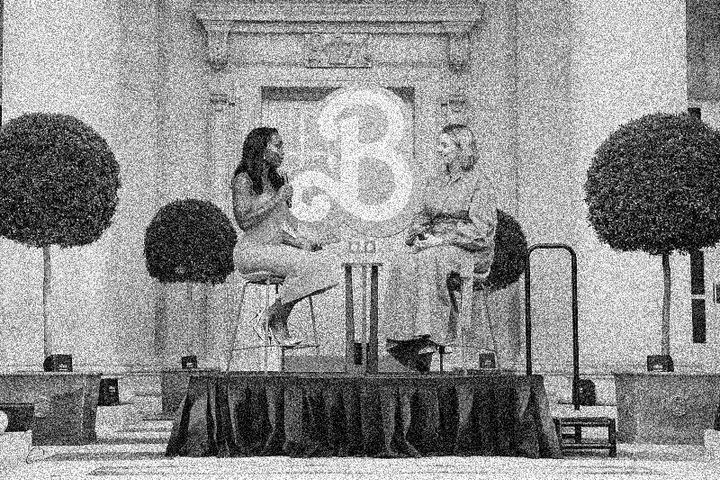I know a song that gets on everybody’s nerves
We live in the most annoying of all possible worlds. So why is it so hard to talk about it?

Before we knew what the internet was, we knew it was annoying. One of the first pieces of genuine internet culture, the first meme, the first viral sensation, was something called Hampsterdance: an HTML page full of rows of dancing cartoon rodents, and a sped-up sample from a Disney song on an endless nine-second loop. For what felt like years, this was the most important thing the human species had to share on its new global communications system. My childhood online was mostly spent surrounded by flashing colors, sped-up music, and manic, shrieking voices. Everything was both unbearable and fascinating at the same time. The old, slow, physical world was dying: the last trumpets blared, and they were playing Yakety Sax.
Something similar happened a decade later, when the first smartphones started appearing. Before phone apps were the substance of all economic growth and all that passed for culture, they were almost uniformly pitched as something with which to annoy your friends. The canonical example was a big red button in the middle of your screen which, when pressed, would make a fart sound. Tremble before the blank perfection of the machine. We understood something in those days: the internet is a kind of noise, an irritant, a mad cynosure, something that exists to ruin your day.
We know better now: the things that happen online are deeply important; they decide the fate of nations. For instance, one piece of internet culture that’s become very significant over the past few months is a recruitment video for the CIA. In the ad, we see a young woman grinning open-mouthed in various antiseptic halls of power, like a coma patient or a dog on opiates, while her voiceover narrates:
I am a woman of color. I am a mom. I am a cisgender millennial who’s been diagnosed with generalized anxiety disorder. I am intersectional, but my existence is not a box-checking exercise. I am a walking declaration. A woman whose inflection does not rise at the end of her sentences, suggesting that a question has been asked. I did not sneak into CIA. I earned my way in. And sometimes I struggle. I struggle thinking I could do more, be more to my two sons, and I struggle leaving the office when there’s so much more to do. I used to struggle with impostor syndrome, but at 36 I refuse to internalize misguided patriarchal ideas of what a woman can or should be. I am tired of feeling like I’m supposed to apologize for the space I occupy, rather than intoxicate people with my effort, my brilliance. I am proud of me.
The reaction on the Left has been split. Does this video mark a historic failure of left-wing movements to adequately confront power? Have we been thinking with ideas handed down from Langley? Or is it just another piece of recuperation, the state trying to appropriate the ‘language of liberation’ for its own ends? On the Right, there’s still some mockery—‘if you’re an Iranian mullah, would this scare you?’—but there’s a growing consensus that this is a frightening development, the final consolidation of repressive woke ideology and the power of the surveillance state. This kind of language hasn’t been co-opted; it’s a cancer of institutions and a threat to the stability of the state. In France, a group of generals has put out an open letter warning that too much talk ‘de racialisme, d’indigénisme et de théories décoloniales’ would lead to a civil war on French soil, deaths in the thousands, and total anarchy, unless they intervene first with a military coup.
These people might have their priorities slightly askew. What’s been co-opted is not the language of liberation; it’s the tendency of people with very little self-awareness to talk a lot about themselves. There are versions of this language that can do other things, but there’s nothing liberatory and nothing frightening about a 36-year-old loudly refusing to apologize for the space they occupy. That person is simply annoying. Probably the most revealing line in the whole spiel is the one about how her inflection ‘does not rise at the end of her sentences’: she’s very proud of herself for not engaging in uptalk, a mostly-female speech pattern widely held to be annoying. Personally, I find uptalk—along with vocal fry—to be basically harmless, but the kind of speech she uses in the video is awful. At least uptalk introduces some variety; this stuff plods. Just listen to it. The strident tone of a self-congratulatory mediocrity, the refusal to use ordinary contractions, the cadences bastardized from Civil Rights-era oratory, an ugly imitation of something great. The voice of a horrible little king, making pronouncements. I am here, it says, and I’m on a mission to make things worse.
So I don’t blame people for dramatically losing their minds over this stuff; something annoying is both fascinating and unbearable. But it’s interesting how it seems to be impossible to object to something annoying simply on the basis that it’s annoying. Annoyances are small, they’re not important; you can swat a fly if it buzzes too close, but it’s hardly worth getting out of your chair. At the same time, any annoyance left alone too long becomes maddening, and the more minor the annoyance, the crazier it makes you. If I’m on the Tube, trying to read a book, and I hear someone’s headphones leaking tinny music next to me, I can usually only make it two stops before it’s entirely impossible for me to concentrate; I’m too busy fantasizing about ripping off that person’s head and daubing racial epithets on the windows with their spinal fluid. But at the same time, I would never in a million lifetimes dream of simply tapping that person on the shoulder and asking them to turn the music down.
The only way to confront an annoyance is to make it into something else. There’s a whole set of neologisms, or existing terms pressed into unfamiliar use, that exist to turn annoyances into harm or peril. Sealioning, gaslighting, microaggressions, abuse. From other quarters, the plague of small annoyances is held to pose an imminent threat to the survival of Western civilization. Within the Left, there’s a lively polemic on the nature of the professional-managerial classes, including in these pages. And obviously this is a worthwhile area of study, but here and there there’s something in the intensity of these debates: the PMC may or may not be the greatest impediment we have to a better society, but as the CIA ad shows, they’re certainly the most annoying class sector capitalism has produced (and, of course, the most insistently annoyed), unbearable in their words and their actions, so obnoxious it’s impossible to look away.
Annoyances are everywhere, and everywhere we refuse to talk about them. This is a foundational human affect, but culture is almost silent about it. Every month, there are dozens of debut novels about trauma or heartbreak; none about simply being peeved. Music can be annoying, but annoyance is not one its usual themes. (The exception, obviously, is Mark E. Smith, who made a career singing about “the things that drain you off and drive you off the hinge: boils, dirty socks, the ceilings collapse; the Sunday morning loud lawnmower, the upstairs Jewish girl damn hoovering every thirty minutes from valium cig withdrawal.”) Most of all, philosophy seems to have nothing to say about the Stimmung of irritation. Fear and anxiety, yes; despair, melancholia, sure; most especially boredom, which is the philosophical affect, a royal road to profundity for everyone from the Stoics through Schopenhauer and Kierkegaard to Heidegger and beyond. Endless ink has been spilled on the subject of ennui, an etymological sibling of annoy. This seems strange, and unfair. Why does the annoying little brother get all the attention?
When philosophy does touch on annoyance, it’s often to complain about something annoying, rather than to think through the annoying as such. So, for instance, Schopenhauer grouses about noise. “The superabundant display of vitality, which takes the form of knocking, hammering, and tumbling things about, has proved a daily torment to me all my life long.” The problem with noise is that it disrupts his thought; sometimes he notices the growing difficulty in thinking before he even hears the noise itself, “just as though I were trying to walk with a weight on my foot.” Most of all, he hates the noise of carters in the streets cracking their whips; what annoys him isn’t just the sound, but the “wantonness” of it: it serves no real purpose, it doesn’t make the horses go any faster, and sometimes the drivers will carry on cracking their whips even after the horses have been stabled and they’re walking home alone. For this, Schopenhauer recommends that they be given “four or five really good blows with a stick.”
There’s an unavoidable class character to Schopenhauer’s essay—and because he lived in a more honest age, he’s pretty open about it. To make bothersome noises is an “impudent defiance offered to those members of the community who work with their heads by those who work with their hands.” We could see this as a kind of revolt, the philosopher-kings dethroned by heroic, awful masses. Except, of course, that it doesn’t work that way at all: today, the most annoying people are those that work with their heads, however hollow those heads might be. Being annoying is not entirely the language of the oppressed. So what is it? Why do people choose to make other people so upset?
The obvious answer is that annoying people is incredibly fun. You can imagine Schopenhauer’s carter getting an incredible amount of pleasure out of strolling around town with his whip and seeing the philosopher gurning poisonously at him from a window. Once they’ve passed through the immediate bodily stages of psychosexual enjoyment, children seem to mostly derive pleasure by singing annoying songs, making annoying noises, or otherwise winding people up. This doesn’t end with the latency period: basically every mature sexual relationship mostly revolves around the act of gently winding up your significant other. We love fart buttons and dancing hamsters; not so long ago I spent a good chunk of my waking hours deliberately trying to infuriate people online. It felt very politically important at the time, but it also felt good; the redder and madder my enemy became, the more I was enjoying myself.
To be annoying seems to satisfy a very basic need: it lets you know who you are to the other. With a few small repetitive gestures, you can take full charge of someone’s attention; they’re incapable of thinking of anything except you. Annoyance is a mirror of the most helpless, passionate love. When I’m annoying my girlfriend, I don’t need to worry about whether I can satisfy her, or if she thinks of me when I’m not around, if there are things in her life that matter more to her than I do—I know exactly who I am: I’m the person she would like to stop doing that, please. Instant phallic potency; power, of a sort. This might be why liberals are more likely to be annoying than conservatives, and why liberals who pretend to be socialists are the most annoying of all: having abandoned so many of the old routes to class power, the shortcut through annoyance suddenly becomes very attractive.
Being the annoyed party is much less pleasant. In Schopenhauer’s account, annoyance prevents thought from taking place. It’s the revenge of the thoughtless and the stupid; once annoyed, “a great intellect sinks to the level of an ordinary one.” In Heidegger’s account of boredom, the world draws away from Dasein, forcing it to confront the profound questions of the self. We could say that in annoyance, the world is brutally, buzzingly present. Impossible to think in the face of so much world. You can see something like this happening in the CIA ad: what are you meant to say to a line like ‘I refuse to apologize for the space I occupy’? There’s nothing of substance there to respond to; your options are limited to omg you’re so valid or please fuck off. Everything annoying in our discourse is a kind of conceptual brick wall—it doesn’t really allow any kind of critical engagement, it just blabs its stupidity in your face, forever. The result, of course, is that most of the critical responses to this stuff are equally banal and thoughtless, produced by the annoyed, in a state of annoyance that makes actual thought impossible. You only need to look at Substack to see what this does to the intellect. A possible theory, then: philosophy is incapable of talking about annoyance because annoyance is the void of thought, something literally unthinkable.
But there’s another possibility. Schopenhauer is annoyed because he would like to think instead of being distracted. At the same time, though, that desire is only felt so keenly because it’s being frustrated. He has what Adorno, in Negative Dialectics, calls the need in thinking:
Yet the need in thinking is what makes us think. It asks to be negated in thinking; it must disappear in thought if it is to be really satisfied; and in this negation it survives. Represented in the inmost cell of thought is that which is unlike thought.
In other words, it’s not so easy to distinguish between thought and its opposite. Could it be that the real reason philosophy can’t deal with annoyance is because thought itself is annoying?
After all, philosophy begins with the act of winding people up. In Plato’s Apology, Socrates attempts to explain why the citizens of Athens are so keen to put him to death, and the pattern he discerns is a familiar one. Meletus and Antyus and the other accusers are furious that Socrates has corrupted the young, that he’s “speculated about the heaven above, and searched into the earth beneath, and made the worse appear the better cause.” Which is to say, they’ve presented him as a threat: this man has done harm. Socrates doesn’t just set out to dispute the content of the allegations; he wants to show that there’s something else, much smaller and more unbearable, that’s brought all this hatred on his head. “I dare say that you may feel irritated at being suddenly awakened when you are caught napping; and you may think that if you were to strike me dead, as Anytus advises, which you easily might, then you would sleep on for the remainder of your lives.” Socrates is annoying; this is why he must die.
And he’s right, there is something basically unbearable in his maieutics, something like a toddler’s endless questioning. Shut up! Why? Because I want you to. But why? Even when he’s on trial for his life, Socrates is clearly having fun; it’s enjoyable for him to tie his enemies’ arguments in loops; there’s a deep pleasure in trapping them inside their own shoddy ideas. As Nietzsche saw, that pleasure and that power is what’s really behind the will to truth. A thought that contains a representation of its opposite; a man who constantly, infuriatingly claims to know nothing, who brings everything back to that same jabbing nullity. Kill him, do whatever’s necessary, overthrow the civilian government of France, just make this annoyance end.
■
Sam Kriss is a writer and dilettante surviving in London.



